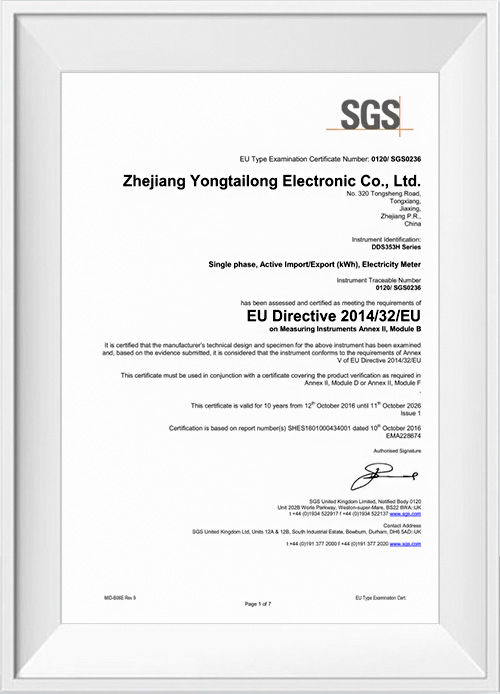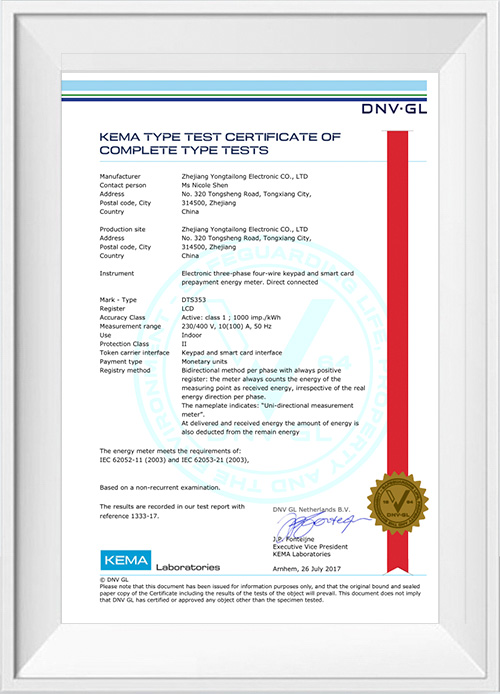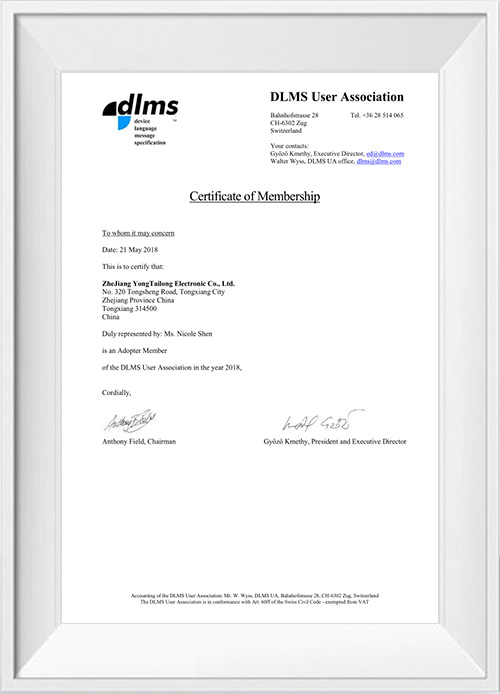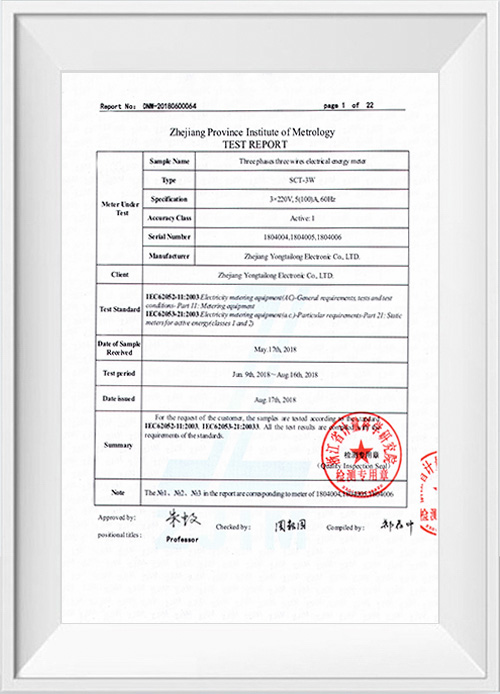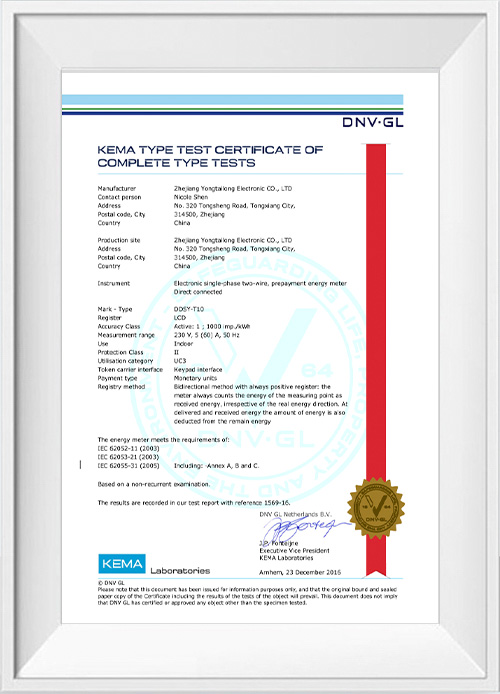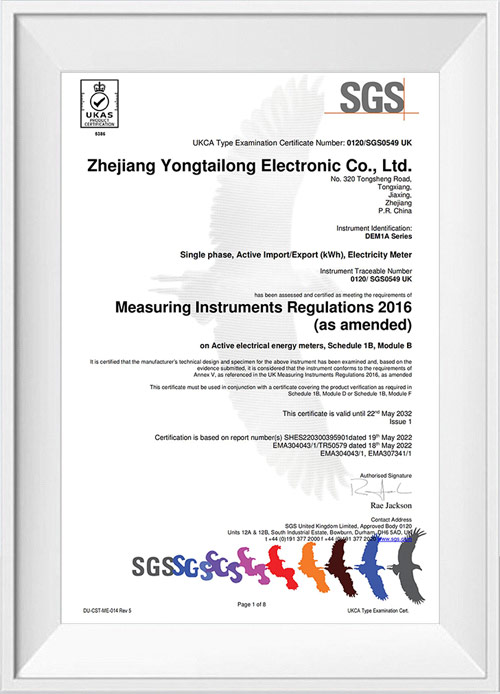Established in 2000, Zhejiang Yongtailong Electronic Co., Ltd. is located in the center of Shanghai, Hangzhou and Suzhou cities. As a professional China DC Energy Meter manufacturers and DC Energy Meter Factory, YTL designs and produces electronic energy meters which are cost-efficient and ideal for the use in solutions for AMR/AMI at residential as well as industrial applications.YTL was one of the first companies in the domestic market with which had an internal R&D department as well as international sales business. YTL is devoted to develop and design all types of wholesale DC Energy Meter, concentrators and solution applications. At present our export volume makes us a leading company for technology and product export to more than 50 countries throughout the world.
DC Energy Meter manufacturers
Zhejiang yongtailong electronic co., ltd
A DC energy meter, also known as a DC watt-hour meter or DC electricity meter, is a type of electrical meter that measures the energy consumption of a direct current (DC) electrical circuit. Unlike AC (alternating current) meters, which are used to measure the energy consumption of alternating current circuits, DC energy meters are specifically designed to measure the energy consumption of DC circuits
According to the installation requirements of the actual application environment, the din rail type DC energy meter, DEM2D series, adopts the standard specification of 75mV, and the corresponding shunt is configured according to the actual load power size, and the RS485 communication is integrated, which is highly applicable.
Welcome To A National High-tech Enterprise
-
2000
Established In
-
500+
Employees
-
50+
Export Country
-
350+
Design Right Patent

YTL News
View All News-
Replacing Your Electric Meter: A Comprehensive Guide
2025-12-121. Introduction An electric meter is a vital device that measures the amount of electrical energy consumed by a residence or business. It serves as the primary tool for the utility company to accurate...
-
Starting from the Core: How a Vertically Integrated Electric Meter Company Controls Product Quality and Costs
2025-12-12In the electric meter manufacturing industry, product quality and cost control have always been core challenges for enterprises. A vertically integrated electric meter company incorporates key indu...
-
Purchasing Guide: 5 Key Factors for Selecting Prepaid Electric Meter Suppliers in Overseas Markets
2025-12-11Against the backdrop of the increasing intelligence of global energy management, prepaid electric meters, as important metering equipment, have shown sustained growth in demand in the international...
-
Top 5 Features: Defining an Excellent Modern Prepaid Electric Meter
2025-12-10In the era of rapid development of intelligent metering equipment, prepaid electric meters have become a crucial component of modern energy management. With continuous technological advancements, t...
Industry Knowledge Extension
YTL's DC Energy Meter
Zhejiang Yongtailong Electronic Co., Ltd., a leading manufacturer of intelligent meters since 2000, offers a comprehensive range of high-precision DC watt-hour meters designed to meet the diverse needs of modern energy management systems. Our DC energy meters provide accurate measurement and monitoring of DC power consumption, empowering businesses and individuals to optimize energy usage and reduce costs.
Technological Advantages:
Independent R&D of core technologies: The company possesses strong R&D capabilities and holds multiple patents in current sampling technology, ensuring the technological leadership of our products.
Customized services: We offer customized products and solutions based on specific customer needs.
Global services: Our products are exported to over 60 countries worldwide, and we have a comprehensive after-sales service system.
Why Choose Yongtailong DC Energy Meters?
Over 20 years of industry experience: The company has extensive experience in the intelligent meter industry, and our products are reliable.
Strong R&D team: Continuous technological innovation ensures that our products remain at the forefront of the industry.
Complete quality management system: Our products have passed multiple international certifications, guaranteeing quality.
Considerate customer service: We provide professional pre-sales, in-sales, and after-sales services.
Zhejiang Yongtailong Electronic Co., Ltd.'s DC energy meters (DC watt-hour meters) are high-performance, highly reliable products widely used in renewable energy, electric vehicles, battery energy storage, and other fields. With our strong technical capabilities and rich industry experience, we provide customers with comprehensive solutions. If you are looking for a high-quality DC energy meter, Yongtailong is your best choice.
What is dc energy meter?
What are the advantages of dc energy meter?
1.Accurate measurement: DC energy meters provide accurate and precise measurement of DC energy consumption.
2.Easy to install: They are relatively easy to install and require minimal maintenance.
3.Cost-effective: Compared to other types of energy meters, DC energy meters are more cost-effective, making them a popular choice for small scale applications.
4.Compatibility: They can be easily integrated with various DC energy sources, such as solar panels, batteries, and DC generators.
5.Real-time monitoring: DC energy meters allow real-time monitoring of energy consumption, enabling users to optimize their energy usage and reduce energy waste.
6.Energy efficiency: They promote energy efficiency by providing accurate energy consumption data, which can be used to identify energy-inefficient systems and reduce energy consumption.
Common applications:
1. Industrial control systems: Din rail DC energy meter is commonly used in industrial control systems to monitor and measure the energy consumption of motors, pumps, and other equipment.
2. Renewable energy systems: They are also used in renewable energy systems, such as solar and wind power installations, to monitor and measure the energy production.
3. Data centers: Din rail DC energy meter is used in data centers to monitor and measure the energy consumption of servers, storage systems, and other equipment.
What is the function of DC watt-hour meter?
DC (direct current) watt-hour meter, also known as DC watt-hour meter or DC energy meter, plays a vital role in the power system. Its main function is to accurately measure and record the energy consumption in the DC circuit, usually accumulated in kilowatt-hours (kWh).
Specifically, the dc kwh meter captures the voltage, current and other parameters in the DC circuit in real time through the internal measurement circuit and sensor, and calculates the energy consumption based on these parameters. After processing, these calculated data will be displayed on the dial in digital form, or transmitted to the host computer or monitoring system through the communication interface.
In the power system, dc power meter are widely used in DC power supply systems, battery energy storage systems, solar photovoltaic power generation systems and other fields. By real-time monitoring and recording the energy consumption in the DC circuit, the DC watt-hour meter provides important data support for the energy management, cost control and energy efficiency evaluation of the power system.
With the development of smart grid and Internet of Things technology, the functions of DC watt-hour meters are also constantly enriched and expanded. For example, by integrating communication interfaces and remote monitoring functions, DC watt-hour meters can realize remote meter reading, remote control, data sharing and other functions, further improving the intelligence level and operation efficiency of the power system.
How does DC energy meter work?
The working principle of DC energy meter (direct current energy meter) can be divided into the following key steps:
1. Data acquisition:
a. DC energy meter first monitors and collects current and voltage signals in the DC circuit in real time through high-precision current and voltage sensors.
b. These sensors can measure currents up to hundreds of amperes and voltages of thousands of volts to ensure the accuracy and reliability of data.
2. Signal conversion and processing:
a. The collected current and voltage signals will be converted to digital signals through internal circuits for analog-to-digital conversion (A/D conversion).
b. Subsequently, the microprocessor inside the energy meter will process these digital signals and calculate the specific value of energy consumption.
3. Data storage and transmission:
a. The energy meter will record and store these energy consumption data, which are usually accumulated in kilowatt-hours (kWh).
b. In addition, the energy meter also has a data transmission function, which can send energy consumption data to the host computer or monitoring system by wired or wireless means, which is convenient for users to conduct remote monitoring and management.
4. User identification and billing:
a. For application scenarios such as public charging piles, digital dc power meter also need to have user identification functions.
b. By identifying user information, the energy meter can record the charging time and power consumption of each user and provide merchants with detailed invoice data.
5. High-precision measurement:
a. DC energy meters use advanced measurement technology and algorithms to ensure the accuracy and reliability of measurement results.
b. Through real-time monitoring and calculation, the energy meter can provide users with accurate energy consumption data to help users better manage energy use.
6. System compatibility:
a. DC smart meter usually have a variety of communication interfaces and protocols, which can be connected and communicated with different types of host computers and monitoring systems.
b. This makes the energy meter widely applicable and compatible in the power system, which can meet the needs and application scenarios of different users.

 English
English 简体中文
简体中文








